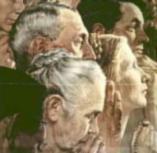 |
|
|
One of the basic principles of our religious rights
is that the government may not inquire into the nature of one's religious
beliefs, or "viewpoint," but only into the sincerity of such
beliefs. Thus, for example, if a person says that he worships water
flushing out of his toilet, this belief must be treated the same as
the belief of another who says he worships a great father in the sky. |
|
Nevertheless, the government may, under current law, proscribe certain activities even if they are said by the adherents of certain religions to be parts of their religion. Thus, we probably won't see chickens killed in schools as part of various religious rites. It is in this area of distinguishing between beliefs and activities, where the real future fight on religious freedom will be found. This is so, because the real significance of this Supreme Court ruling won't really be seen until some of those who hold unpopular religious views and who are often persecuted for these views show up at their local schools to hold meetings. Consider the sky god/ toilet god examples given above.
Perhaps one group believes in a great father in the sky. No problem.
That's their belief and the government may not say that this isn't a
real belief, or that their god isn't real. Now, in our culture, those
who believe in some variation of a god that is up there, usually worship
by praying to the one they believe is up there. Again, no problem. Consider,
now, the religionists who believe that god is seen when water is flushed
from their toilets. No problem. That's their belief and it's as valid,
in the eyes of the government, as the belief in a sky god. But, further
suppose that in order for this group to worship their god, they must
flush their toilets. This flushing is an activity, and the government
may proscribe it. Or can they? If the god of these people is seen in
the flushing itself, then if the flushing is proscribed, they won't
be able to worship at all, and they will have had the government interfere
in their religion. |
|
Switch now, to something that may actually happen in the very near future. What will local school officials do when members of the Church of the Creator or of various Identity Churches or other religious groups, whose most basic and central beliefs sometimes revolve around white separatism or white supremacy, or whose beliefs have been characterized by those who hate these religions, as "racist" show up to use the schools? Will the local school officials tell them that they can use the facilities, but only if they allow non-whites to attend their religious activities even though this might be a sacrilege to these people? You can see the problem. It would be a little like saying that Orthodox Jews may use a school building for religious purposes, but they may not segregate women and men from each other as is demanded by their religious beliefs. If past experience is any clue, we might expect that
the government will try to allow the gender segregation, but somehow
ban the racial segregation based on public policy. However, if government
does this, then we're back in the thick of religious discrimination.
True religious freedom does not allow public policy to discriminate
against a religion because some people in government or in the private
sector (who are usually of a different religion) don't like the beliefs
of this other religion, or because these beliefs don't comport with
what we think people should believe. |
|
Go even further on this. Suppose those who believe that the races should be separate also believe that this was a revealed truth from their god. Does the government then say that human laws and sensibilities overrule what these religionists may deeply believe that their god told them to do or not do? If this happens, then we have government in the business of approving religions based on secular and human concerns. And, what do the people in this religion do? Do they do what they believe their god told them to do, or do they do what the government tells them to do, lest they be arrested? Stay tuned on this one, dear friends, because while on the surface it appears that religious freedom just got a boost, the case at bar was about a pretty mainstream and innocuous group. True religious freedom will be demonstrated when a controversial group, whose beliefs are counter to the current orthodoxy, demands the right to use school facilities. # # # |
|